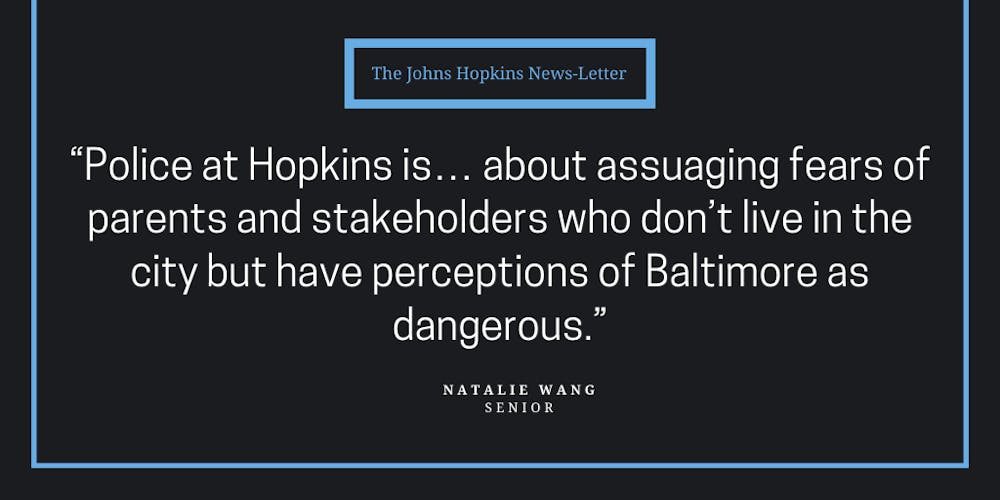Teachers and Researchers United (TRU-UE) and the West Coalition co-hosted a panel titled “Policing Higher Ed in Baltimore: From JHPD [Johns Hopkins Police Department] to Cop City'' on Sept. 20. The panel featured a TRU-UE member, professors from Goucher College and the University of Baltimore, undergraduate and graduate students from the University of Maryland and Tawanda Jones, leader of the West Coalition.
The primary focus of the panel was the discussion of police abolition on college campuses in Baltimore. During the panel, Carolyn Robbins, a doctoral candidate in the Department of Communication at the University of Maryland, explained the reasonings for her belief in the necessity of change.
“We live in a carceral society and adding more police reflects a lack of imagination, because police don't actually help with a lot of the things we ask them to help us with,” she said. “It's not because cops are the answer. It's because we lack the political will and social abolitionists’ imagination to ask what else is possible?”
The panelists described their own encounters with campus police in Baltimore as well as the experiences of friends and fellow organizers. Robbins pointed out that universities often rely on the structures within the policies to institute reform, a system that she argues has failed to result in any substantive progress.
A few of the speakers also expressed their frustration about the proposed $330 million training facility for the Baltimore Police Department (BPD) and Baltimore City Fire Department. Joshua Davis, a history professor at the University of Baltimore, emphasized the misplaced financial priority when looking at where the city allocates money. In particular, Davis commented on the financially driven motivation behind JHPD.
“Crude analysis of motivation for having a police force [at Hopkins] would be that the administrators are afraid that wealthy parents are afraid for their kids, therefore, let’s spend money. Michael Bloomberg likes it, so it will make us more money, attract more people, [put us on par with] peer institutions, and so on and so forth,” he said. “We [higher education institutions] are dealing with basically a pretty severe level of austerity.”
Other undergraduate Hopkins students who attended the panel echoed Davis’ analysis of the formation of the University’s police force.
In an email to The News-Letter, senior Natalie Wang explained her perception of how the JHPD functions.
“Police at Hopkins is less a question of student safety or security,” she wrote. “Rather, it's about assuaging fears of parents and stakeholders who don't live in the city but have perceptions of Baltimore as dangerous.”
Later in the panel, Jones explained the murder of her brother, Tyrone West, at the hands of police officers Nicholas Chapman, Jorge Bernardez-Ruiz, and at least 15 other officers who were reported at the scene. The West Coalition was founded in response to this incident. Led by Jones, West’s family and community began holding weekly protests, called “West Wednesdays,” to demand accountability for West and all other victims of police brutality.
Jones called the audience to action, primarily to protest against newly appointed Baltimore Police Commissioner Richard Worley. Worley was previously the Deputy Commissioner of the BPD, which Jones claimed was responsible for protecting the police officers who murdered West.
“This is real. Don’t wait until it happens to your family. It is critical to know that not only was my brother brutalized, murdered and killed, but the cover-up is far worse,” she voiced. “So many of the people I work with say ‘We are proud of you,’ but that means nothing if you're not doing anything. The time is now. How many people [have] got to be murdered?”
The event concluded with a reading of the names of the victims of police brutality across the U.S. in the past month.
Although the majority of attendees were Hopkins graduate students, many undergraduate students, like sophomore Vanessa Han, attended the panel because their interest in police abolition was piqued during classes at Hopkins. Han explained her newly developed interest in an email to The News-Letter.
“Organizing police abolition is a topic I've become increasingly interested in, especially as I learn more about it in both my classes as well as how it affects people in the real world, particularly in the Baltimore community,” she wrote. “JHPD is extremely important because it represents the encroachment of policing into more and more spheres, and the opposite of abolition.”





